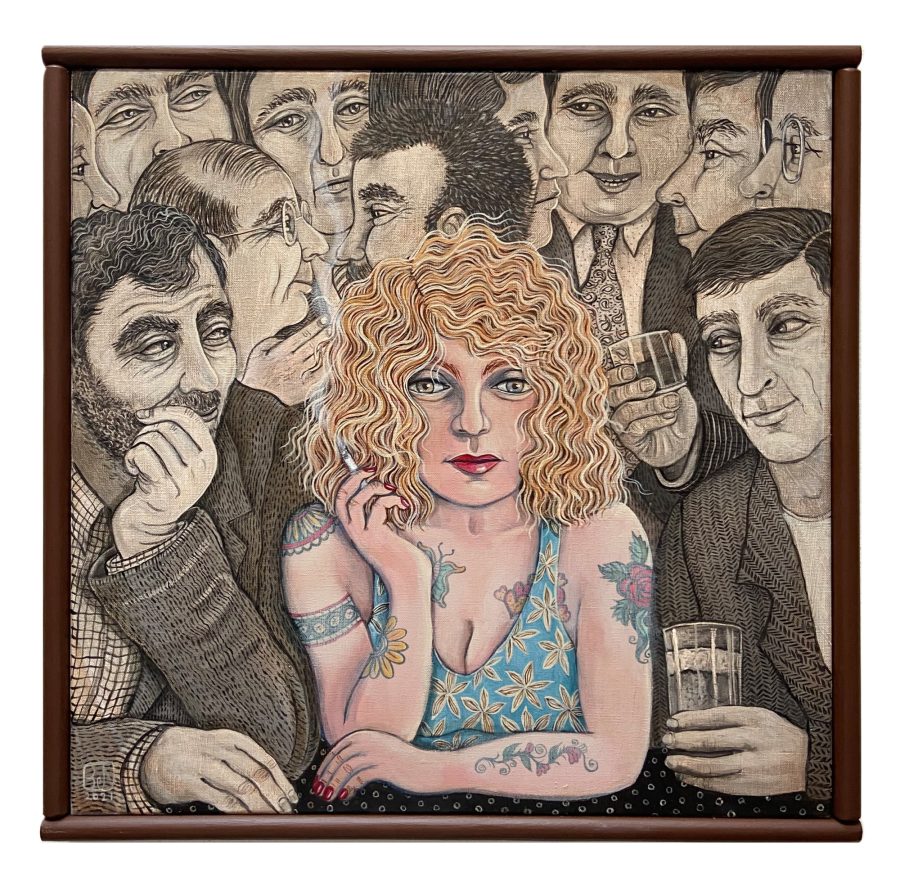Male Gaze
Laura Mulvey: Hollywood mainstream films/imagesŌĆō are created to reproduce dominant male heteronormative ways of looking it occurs when the audience is put into the perspective of a heterosexual male (1975).
“Shakespeare’s sister”
It is not difficult to find that those who stand at the top of the literary or even cultural pyramid or hold the power of speech are often men. Woolf once put forward the theory of “Shakespeare’s sister” in A Room of One’s Own, thinking that if Shakespeare had a sister with the same theatrical talent as himself, the sister would not have been treated like Shakespeare, who could not read, had to get married, and became an unnamed common woman in Elizabethan times, who could not shine as brightly as her brother, but had to suffer because she could not give full play to her talent. brother to shine as brightly as he did, but instead had to suffer because she could not fulfil her talent. shine like her brother, but she would have gone mad with illness and eventually died because she was unable to use her talents.
Such a statement was confirmed by Mozart’s sister, Maria Anna Mozart. Apparently Maria possessed musical talent and musical attainments equal to, if not superior to, those of her brother, but in 1829 the late widow Maria, blind and living in poverty, died soon after.
Television language and footage

The film camera has a huge appeal, and then by focusing and enlarging it with a film camera, it naturally becomes a commodity with a huge market value. Film cameras often divide the female body into different parts to be photographed, such as close-up shots of breasts and buttocks. Through conscious lens design, it creates perspectives that the viewer watches on behalf of the subject, awakening the viewer’s hormones and feelings. For example, in slow motion, men are usually fighting or killing while women exude sensuality.

In social news, many male crimes blur the presence of men, and the subject of the event title becomes female, deepening the impression of female accident rates. For example, the stereotypical female driver is that only female drivers cause car accidents. There are also stories of women being victimized, where most media focus on the women who are victimized and gloss over the men who commit the crime. It can only be said that under the male gaze for a long time, women’s right to speak has been denied.
Conclusion
The gaze is innate, whether the society is patriarchal or feminist, patrilineal or matrilineal, as Sartre said, “the gaze of the other” When we exist in the world, the gaze already exists. It is only that we talk about the male gaze more than the female gaze, because the male gaze has indeed existed longer than the female gaze, and we can even say that behind the male gaze is a patriarchal gaze, and that the male gaze itself is not just a male gaze at women, but also a male gaze at men who have a higher level of power, at men who have less power than they do. Gender is innate, class is acquired, and in the process of class formation, someone will eventually become the second sex, only currently women are the second sex, and so we emphasize that the existence of the male gaze forces women to become the second sex. We can also imagine, assuming that it is women who hold the power of discourse, would men be the second sex? Naturally, they would be. At that point perhaps the female gaze would be discussed far more than the male gaze would be discussed. However, will the matriarchy that could give birth to the female gaze ever arrive? No one knows.
Reference:
Durham, M. J., & Kellner, D. 2006. Media and cultural studies: keyworks. Oxford: Blackwell.
Yan, S. 2023. Resistance and integration: the ubiquitous male gaze. Available at: https://movie.douban.com/review/14925718/
Sun, H. 2023. The male gaze in cinema quietly affects the world. Available at: https://zhuanlan.zhihu.com/p/636288416



Hi! This is a really good blog post, you explained the male gaze in a clear way! What is your own personal opinion of the male gaze? Do you think it will get worse in the future?
Hi, Ree! Thanks for ur compliments, personally, I think the male gaze is an artifact of patriarchal society, it’s been in the world for a long time and is even ingrained in many people’s consciousness. I’ve always believed that this society is black and white, the female gaze in opposition to the male gaze, and feminism in opposition to male power, they are both at opposite ends of a scale. We can neither be perfectly balanced nor can we pursue only one side. As I mentioned, the reason women are the second gender now is because of the male gaze, but if one day the female gaze makes men the second gender, as a woman, I would probably have as much prejudice against the second gender as many men do now. This is a normal phenomenon, modern societies are not going to be completely patriarchal for the most part, they are dynamically balanced. Besides, more and more people are getting educated, I’m sure the male gaze won’t get worse. But at this stage, perhaps what we should do more is to put a check on the streaming media and entertainment culture materializing women. Some people may think that art comes from life, but there should be a balance, because life also affects art, and it should not be caught in a dead circle.